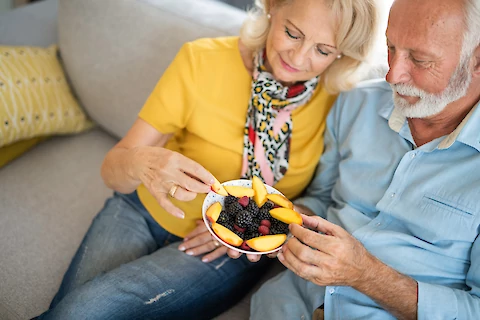
Understanding and meeting the dietary needs of our senior loved ones is integral to their health and well-being. Nutritional requirements often change as we age, and one essential nutrient that is sometimes overlooked is dietary fiber. This Senior Helpers blog post examines the essential role of fiber in senior diets. Our goal is to offer an informative guide for family caregivers about the importance and benefits of fiber and its profound impact on improving digestive health and preventing chronic diseases.
Understanding Dietary Fiber
Fiber is the part of plant-based food that digestive enzymes can't fully break down. Essentially, there are two types of fiber. Soluble fiber dissolves in water and can help lower blood glucose and cholesterol levels. Insoluble fiber, on the other hand, does not dissolve. This type of fiber helps food move through the digestive system, which promotes regularity and aids in preventing constipation.
Importance of Fiber in Senior Diets
Getting enough fiber in your diet has several health benefits, especially for seniors. Here is how it can make a difference:
Digestive Health
Fiber, of course, is a champion for digestive health. It adds bulk to the diet resulting in a better functioning digestive system. Many seniors experience constipation, and eating more fiber is a great way to alleviate this common complaint.
Chronic Disease Prevention
Fiber also plays a significant role in the prevention of chronic diseases. Various studies have linked high fiber consumption to a reduced risk of diseases like heart disease, type 2 diabetes, and certain types of cancer. This is because fiber can help reduce blood pressure, lower bad cholesterol levels, and maintain healthy blood sugar levels.
Healthy Weight
Eating soluble fiber might also aid in achieving a healthy weight. It makes you feel fuller for a longer duration and reduces your appetite, thereby preventing overeating. This aspect can be particularly beneficial for seniors who are striving to maintain or lose weight.
Fiber Recommendations for Seniors
Seniors need to get the right amount of fiber in their diets. According to recommended dietary guidelines, women aged 50 and above should strive to consume at least 21 grams of fiber per day. Men in the same age group should consume at least 30 grams of fiber. However, as a word of caution, increasing fiber intake should be a gradual process. A sudden increase can lead to bloating or cramps.
Incorporating More Fiber into a Senior's Diet
Increasing fiber in a senior's diet can be achieved by incorporating more high-fiber foods into their meals. This includes foods like oats, lentils, apples, oranges, carrots, and whole-grain bread. For breakfast, consider serving oatmeal topped with a handful of berries for an extra fiber boost. A lunch of lentil soup can be both satisfying and fiber-rich. Grilled salmon with a side of steamed vegetables or a large salad is a healthy and delicious choice. The skin of many fruits and vegetables also contains fiber, so leave it on whenever possible.
To ensure palatability, introduce new foods gradually and remember that everyone has unique tastes. A person who does not enjoy whole-grain bread might prefer a crisp apple or a bowl of oatmeal. For safety purposes, it is a good idea to be cautious of potential choking hazards. Ensure all food is cooked thoroughly and is soft enough for your senior loved one to chew and swallow easily.
Senior Helpers Can Assist With Senior Nutrition
Senior Helpers offers personalized, in-home senior care services to meet the individual needs of seniors and their families in our communities. If you live in the Houston, South Houston, or Harris County areas, contact us anytime at Senior Helpers Central Houston. We are here to provide the help you need to ensure your loved ones receive the best care possible.